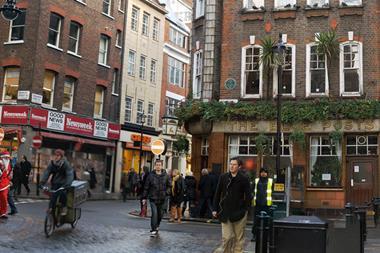Soho Estates’ John James and Steve Norris plan to transform streets synonymous with sleaze into edgy, upmarket bars, shops and restaurants. Hardeep Sandher met them. Photographs by Tim Foster
Walking along the streets of Soho last month, John James bumped into his late father-in-law and former wife. He had stumbled upon a film shoot where Steve Coogan stood alongside several other actors immortalising Paul Raymond. The shoot was for a new film based on the porn publisher’s life, the King of Soho, which will be released next year.
“It was a strange feeling. There was Steve Coogan dressed up as Paul, with an actress playing [Paul’s daughter and James’s ex-wife] Deborah standing next to me,” says James. “I thought: ‘I’ve seen that before’. It’s because I was there. That was me for years — Paul, Deborah and me. I recognised all the personalities.”
For the past 26 years, James has lived and breathed Soho. As the son-in-law of Raymond and head of estates for much of the 1990s at his property company, Soho Estates, he became well accustomed to working for the man who made his name in strip clubs and sex shops.
That all changed in March 2008 when Raymond died at his home in Piccadilly at the age of 82. He left his entire personal estate, including Soho Estates, to his two grandchildren, 25-year-old Fawn James — Deborah’s daughter, whom James adopted after her death in 1992 — and her younger sister, India Rose, James and Deborah’s daughter. The bulk of his worth was not from the publishing empire, which printed top-shelf magazines such as Razzle and which had made him famous, but from the estate he had spent four decades accumulating in and around Soho.
As the media focused on the heiresses’ new-found fame and wealth, James was desperate to protect them both and the company. Questions were raised about the future of Soho and if, with James at the helm, it would exploit the area’s prime values by selling the estate.
This was new territory for the private company, which had always been fiercely secretive about its interests, particularly during Raymond’s later years, when he became increasingly reclusive.
Family fortunes
Today, Soho Estates owns more than 60 acres across Soho and Leicester Square, and is one of London’s largest landowners. The estate is estimated to be worth more than £370m. As managing director, James manages the estate on behalf of his daughters and has spent the last two years formulating plans to build it a new future.
In March 2011 he appointed Steve Norris, former London mayoral candidate and Property Week columnist, as chairman. In May this year, the company purchased the Foyle family’s £62.5m portfolio of nine properties across Soho and the West End. And this month, it emerged that the company was planning to redevelop one of the sleaziest stretches of Soho on Walkers Court, where Raymond opened the UK’s first strip club, the Raymond Revue Bar in 1958.
“Our ambition for Soho is to be edgy, but not sleazy,” says Norris, when Property Week meets him and James at Soho Estates’ Bateman Street office, where the duo have come together to talk for the first time about the company.
It is compelling to see the two men speak. Norris is the strategist, whose political background comes through in his bold confidence when he talks about his vision for Soho.
“People have always loved the character of Soho: its low-rise buildings, its intimacy and edge. We need to keep that originality — not the sleaze, but its heart. The heart of Soho needs to be protected.”
James is quick to interject.
“But this isn’t a property development company and our job isn’t to sanitise Soho. Soho Estates is effectively a family estate, and so mine and Steve’s job is to make sure that every asset it owns is optimised in terms of its value for the girls.”
Are Soho’s sex shops and strip bars on the way out?
“The sex industry in Soho is a misnomer,” says Soho Estates managing director John James, but he admits: “There were prolific sex-based businesses in Soho going from the 1950s through to the 1980s.”
However, the sex industry has changed. James says sex is no longer taboo because everything is available to watch on Channel 4 at 9 pm.
“There is none of that ‘man jumps out of shop pretending he was never in there’, anymore.”
There is no denying the public’s nostalgia about Soho’s sex shops, in which Raymond invested.
As he said: “There will always be sex — always, always, always.”
But James and Norris agree the industry has been dying out because of the internet. Today, all sex shops require licences , and the City of Westminster Council has provided more
than dozen in Soho.
Norris says the group is clamping down on illegal sex shops, but is “relaxed” because they will be forced to close themselves in due course.
In their place will be clubs such as the Box, which opened in Walkers Court in March 2011. The Daily Mail described it as Britain’s “seediest sex club”, but it has not stopped royalty — both real and pop — turning up for a £3,000-a-night table.
“It is a 21st-century version of what Paul Raymond did in 1958 with the Revue Bar,” says James. “Girls could walk around topless for the first time. The Box is similar in that it’s risque and has its genders all confused. But it gets folk into Walkers Court that never came here before.”
James talks about Soho from a more emotional perspective. He worked with Raymond for more than 20 years, and has been a part of his family through his daughters, who were close to their grandfather. But working so closely with Raymond meant he had to abide by his rules.
Raymond was not a property man. Soho Estates was created to invest the vast amounts of cash his magazines were making and there was never a real strategy. He famously only bought assets within walking distance of his Soho office, and never borrowed money to purchase property. Value was paramount: he would never pay a penny more than he first offered. But James is not afraid to break away from Raymond’s rules.
“Back then, we were a family business run by an autocratic individual and that was absolutely right for that generation,” says James, who explains that, as a result of Raymond’s ad hoc approach to investment, the 60 acres it owns is scattered all around Soho rather than in one block.
Our ambition for Soho is to be edgy, but not sleazy
Steven Norris, Soho Estates
“But I can’t live by Paul’s rules forever because, although some of them are excellent, they need to be interpreted in today’s market. That’s
why Steve has come on board, to help us take Soho Estates into a modern era.”
The new strategy is simple: it will focus on “polishing the family silver”. When he was alive, Raymond would rebuff James’s requests to refurbish buildings, asking: “Why are we spending the money, if we already have a tenant in there paying rent?”
James and Norris recognise this is not the way to manage property.
“We will take each property we own and ask ourselves, are we optimising the value of it?” explains Norris, who says the changes implemented by him and John over the past two years have brought “professional values” to the company.
“Although ground-floor uses are fully let to restaurants and bars, we will ask if we have underdeveloped upper parts. Walkers Court is in need of development and the recently purchased Foyles block presents another obvious development opportunity [box, below].
“We want to see how we can develop things to benefit from the Tottenham Court Road Crossrail station and open up Soho to the north. These are things we will work on to maximise value.”
Soho’s revue
- Foyles block: Soho Estates’s managing director John James describes its purchase of the 120,000 sq ft Foyles block at 111-117 Charing Cross Road and 10-14 Greek Street as a once-in-a-lifetime opportunity. There are several “gaps” in the property, which means it could be redeveloped into a scheme three times the size. James and chairman Steve Norris are inviting operators to pitch ideas for the mammoth site, which they expect to have a mixed-use element such as retail and a hotel.
- Walkers Court: Many of the properties along Walkers Court will undergo a revamp. Sex shops will be reconfigured to create New York-style delis, for example.
- 76 Dean Street: Built in 1735, the property was partly destroyed in a fire in 2010. Soho Estates is in negotiations with Soho House creator Nick Jones to develop a private club.
New rules
Norris is also keen for change to succeed in today’s market. “It is quite an amazing thing for Paul to have put this estate together in the time that he did.
It took the landed estates hundreds of years. To continue it, we have to run it on proper rules, but with the ethics and in respect of what Paul started.”
Raymond was burned once by a bank in the 1960s when he took on some debt, and vowed never to make the same mistake. However, James and Norris bought the Foyle portfolio with bank funding.
Paul ran strip clubs and was surrounded by girls but he would have understood the sex industry was evolving in Soho and the need to change and focus properly on the property estate
John James, Soho Estates
“Many in the property industry would give their right arm to not have any debt on their books,” says Norris. “But it can make you complacent and
it becomes too easy to say: ‘Well, the building is earning £1m a year. What do I need to do with that?’
“The answer is: make it earn £2m pounds.”
The Foyle purchase created a new rule: if the money is cheap enough and the deal good enough, borrowing a little against a huge asset makes sense.
The duo, however, are unlikely to work on joint ventures with neighbours Shaftesbury and Capital & Counties because they have one rule of Raymond’s on which they will not be moved: the sale of any of its assets. Although parts of the estate were carved up and it has been reported Howard, Raymond’s son, received around £78m, Soho Estates refuses to sell.
“It is not ours to sell,” says James. “It is for Fawn and India and future generations. We don’t spend time worrying about what buildings are worth because that is nothing to do with our strategy. The issue is to make sure they are earning to their full potential.”
Fawn James has already been appointed to the board and is “listening and learning”, so she can be ready when she has to make the important decisions, says her father. She has previously stated she was pleased the porn magazine element of the business has been sold in 2009 — the disposal was already in progress when Raymond was alive — because it is not something with which she would like to be involved.
James has already converted a lot of Soho into one-off entities such as cabaret club the Box and brought in new restaurant and bar chains (box, above).
He adds that part of its strategy to add value to the estate will be to shun retail chains in favour of the next Paul Smith or Vivienne Westwood.
“Paul recognised entrepreneurs and, if it was a young man who was trying to make a go of things, he’d give them a chance. It was a good attitude and we will keep to those principles.”
If Raymond were still alive today, would he do the same?
“Paul was a colourful character — the film with Coogan will catch those bits,” says James. “I mean, he was not a vicar and he didn’t stand for parliament. He ran strip clubs and was surrounded by girls. If Paul was alive now, he would have understood that the sex industry was evolving in Soho and the need to change and focus properly on the property estate.
“I like to think he’d be pleased with us boys.”
Sprucing up or sterilisation? Let us know what you think of Soho Estates’ vision at letters@propertyweek.com
CORRECTION: In our 22 June 2012 issue, we reported that Howard Raymond had been fighting behind closed doors for a share of his late father’s estate. This is not true. Howard Raymond has never made any claim on, or asserted that he has any interest in, his late father’s estate. Property Week is glad to make this correction and has apologised to Mr Raymond for any embarrassment or upset caused.”
































No comments yet